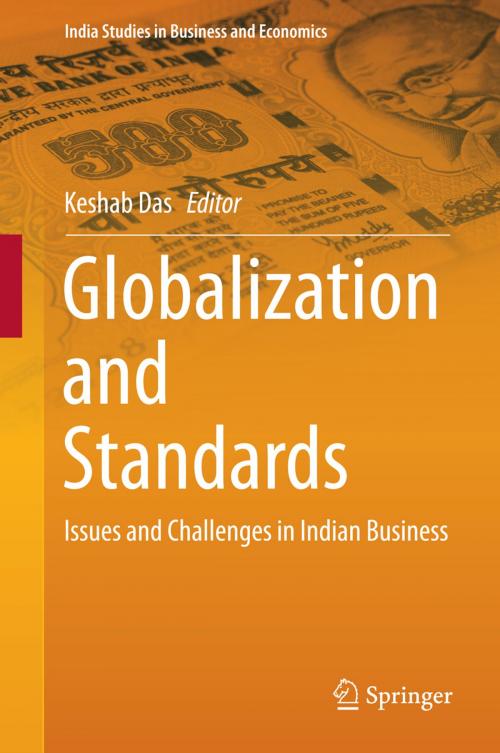Globalization and Standards
Issues and Challenges in Indian Business
Business & Finance, Economics, Urban & Regional, International Economics| Author: | ISBN: | 9788132219941 | |
| Publisher: | Springer India | Publication: | September 29, 2014 |
| Imprint: | Springer | Language: | English |
| Author: | |
| ISBN: | 9788132219941 |
| Publisher: | Springer India |
| Publication: | September 29, 2014 |
| Imprint: | Springer |
| Language: | English |
The changes following more than two decades of economic reforms and globalization of the Indian economy – at state, corporate sector, and consumer level – raise interesting questions on the ways in which the stakeholders will continue to engage on the world stage, politically, socially and economically. One key feature of global trade over this period has been the growing importance of not only product standards but, importantly, labor, environmental, food safety and social standards. Being essentially a non-tariff barrier,standards have often become critical to market access and essential to sustained competitiveness. This has a clear impact on the manner in which both global and Indian business is conducted now and in the future. It also underlines the need for a new area of enquiry that addresses the following questions: How are the Indian public and private actors – the state, domestic firms, local consumers and society – influencing and being influenced by such standards? Do standards really matter in an overwhelmingly informal production sphere, with consumers deeply segmented on the basis of a highly skewed distribution of income and with the rural population becoming further marginalized?
We have limited knowledge about the challenges faced and strategies pursued by these key domestic actors, both public and private. How have they been able to drive these processes and what are their implications for larger concerns with inequalities and the conditions of the poor? How does the omnipresent informality influence compliance, encourage multiple standards and affect the chances of addressing institutional dysfunctionality? What role does regulation play? These are some of the issues dealt with in the book, which has chapters focusing on aspects of specific sectors such as microfinance, pharmaceuticals, automobiles, tea trading, the role of the state and changing consumer influence.
We have limited knowledge about the challenges faced and strategies pursued by these key domestic actors, both public and private. How have been they able to drive these processes and what are the consequences of these changes for the Indian economy, other emergent economies and for the rest of the developing world? In particular, what are their implications for the wider Indian society, especially on concerns with informality, inequalities and the conditions of the poor? How does informality in its omnipresent form influence compliance, encourage multiple standards and chances of addressing institutional dysfunctionality? What role does regulation play? These are some of the issues dealt within the book wherein chapters focus on aspects of specific sectors, trading, role of the state and changing influence of the consumer.
The changes following more than two decades of economic reforms and globalization of the Indian economy – at state, corporate sector, and consumer level – raise interesting questions on the ways in which the stakeholders will continue to engage on the world stage, politically, socially and economically. One key feature of global trade over this period has been the growing importance of not only product standards but, importantly, labor, environmental, food safety and social standards. Being essentially a non-tariff barrier,standards have often become critical to market access and essential to sustained competitiveness. This has a clear impact on the manner in which both global and Indian business is conducted now and in the future. It also underlines the need for a new area of enquiry that addresses the following questions: How are the Indian public and private actors – the state, domestic firms, local consumers and society – influencing and being influenced by such standards? Do standards really matter in an overwhelmingly informal production sphere, with consumers deeply segmented on the basis of a highly skewed distribution of income and with the rural population becoming further marginalized?
We have limited knowledge about the challenges faced and strategies pursued by these key domestic actors, both public and private. How have they been able to drive these processes and what are their implications for larger concerns with inequalities and the conditions of the poor? How does the omnipresent informality influence compliance, encourage multiple standards and affect the chances of addressing institutional dysfunctionality? What role does regulation play? These are some of the issues dealt with in the book, which has chapters focusing on aspects of specific sectors such as microfinance, pharmaceuticals, automobiles, tea trading, the role of the state and changing consumer influence.
We have limited knowledge about the challenges faced and strategies pursued by these key domestic actors, both public and private. How have been they able to drive these processes and what are the consequences of these changes for the Indian economy, other emergent economies and for the rest of the developing world? In particular, what are their implications for the wider Indian society, especially on concerns with informality, inequalities and the conditions of the poor? How does informality in its omnipresent form influence compliance, encourage multiple standards and chances of addressing institutional dysfunctionality? What role does regulation play? These are some of the issues dealt within the book wherein chapters focus on aspects of specific sectors, trading, role of the state and changing influence of the consumer.















